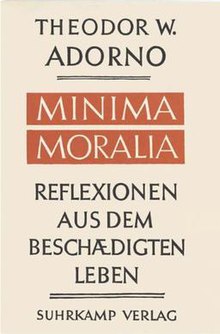
Back الأخلاقيات الدنيا Arabic Minima Moralia German Minima Moralia Spanish اخلاق صغیر Persian Minima Moralia French Minima moralia Italian Minima Moralia Latin Minima Moralia Polish Минима моралија Serbian Minima Moralia Swedish
 Cover of the German edition | |
| Author | Theodor W. Adorno |
|---|---|
| Original title | Minima Moralia: Reflexionen aus dem beschädigten Leben |
| Country | Germany |
| Language | German |
| Subject | Philosophy |
| Published | 1951 |
| Media type | |
| Part of a series on the |
| Frankfurt School |
|---|
 |
Minima Moralia: Reflections from Damaged Life (German: Minima Moralia: Reflexionen aus dem beschädigten Leben) is a 1951 critical theory book by German philosopher Theodor W. Adorno. Adorno started writing it during World War II, in 1944, while he lived as an exile in America, and completed it in 1949. It was originally written for the fiftieth birthday of his friend and collaborator Max Horkheimer, who had co-authored the earlier book Dialectic of Enlightenment with Adorno.
The book consists of 153 aphorisms and short essays that reflect on the nature of modern life and the impact of Capitalism, Fascism, and mass culture on the individual. Adorno critiques the alienation, conformity, and loss of individuality in modern society, arguing that the conditions of late capitalism have made it increasingly difficult to lead a genuine, fulfilling life.
He explores themes such as the commodification of culture, the decline of critical thinking, and the erosion of personal relationships. Historian of Philosophy Peter E. Gordon argues that the "task of Minima Moralia is to assist us in seeing the redemptive surplus that lies unrealised at the interstices of everyday experience."[1]
The book exercised a profound influence over the development of critical theory, and, along with his other major books, has continued to influence generations of scholars, writers and artists across fields including aesthetics, moral philosophy, cultural studies, sociology, and psychology.[2][3][4]
- ^ Cite error: The named reference
:0was invoked but never defined (see the help page). - ^ Buchanan, Ian (2018-02-15), "Adorno, Theodor", A Dictionary of Critical Theory, Oxford University Press, doi:10.1093/acref/9780198794790.001.0001/acref-9780198794790-e-11?rskey=ijw2fv&result=11, ISBN 978-0-19-879479-0, retrieved 2023-10-04
- ^ Zuidervaart, Lambert (2008-12-09). "Review of Theodor Adorno: Key Concepts". ISSN 1538-1617.
{{cite journal}}: Cite journal requires|journal=(help) - ^ Bush, Lawrence (2016-08-05). "August 6: Theodor Adorno". Jewish Currents. Retrieved 2023-10-04.
© MMXXIII Rich X Search. We shall prevail. All rights reserved. Rich X Search